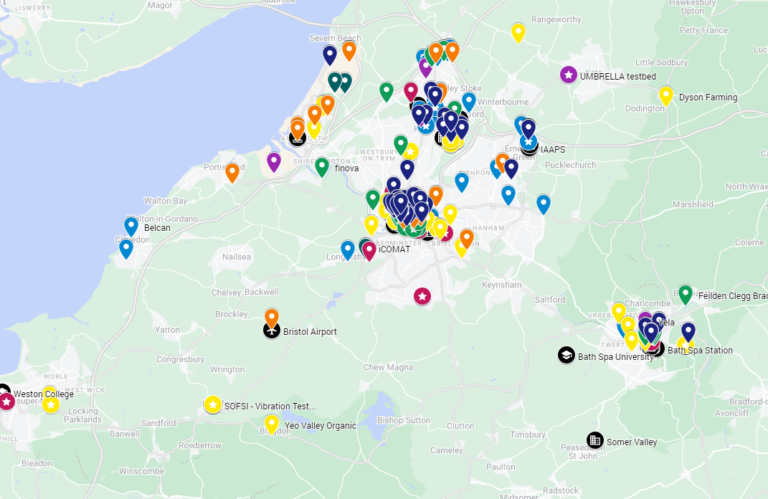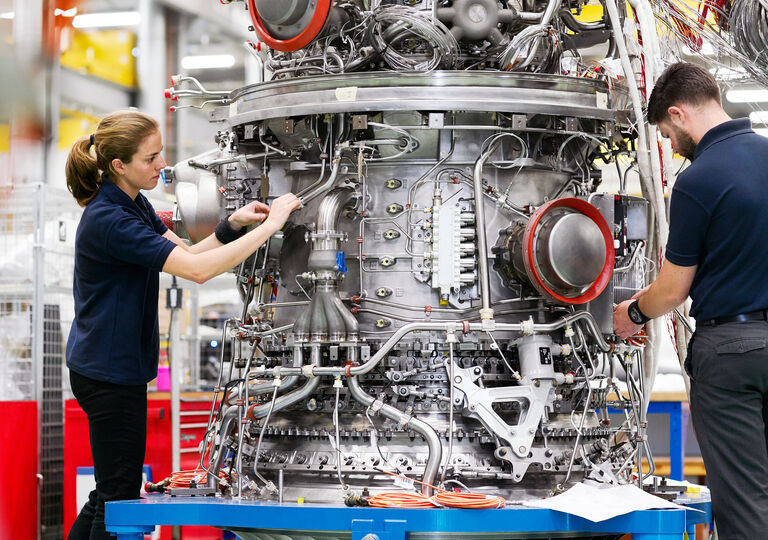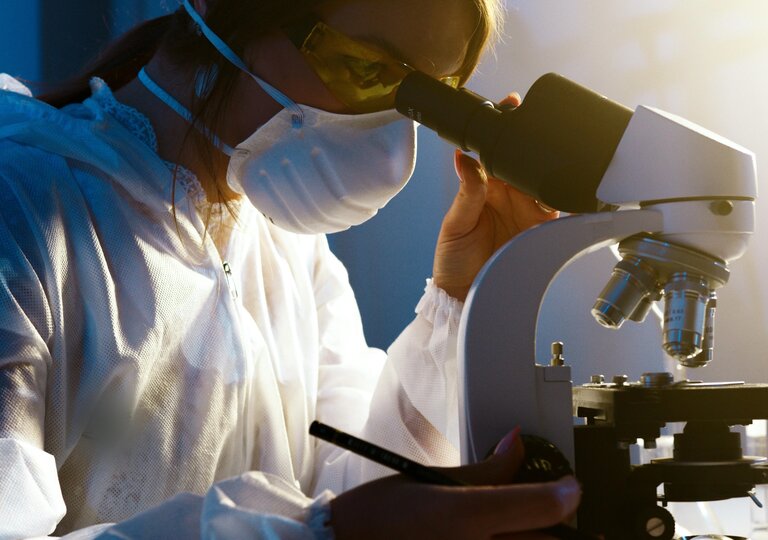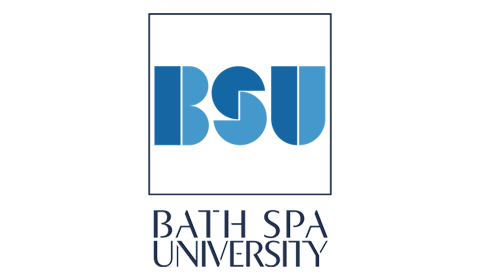
Centres of excellence
The Bristol & Bath region is the centre of world-leading expertise across sectors.
Our region is home to a vast network of remarkable centres of excellence, providing leadership, best practice, research, support, and training with wide-reaching or international significance. From the Bristol Robotics Laboratory to Bottle Yard Film Studios, the innovation to come out of these dedicated centres has national and global impact.

Map of region
The expansive network of organisations and centres of expertise thrives within our region.
Key sectors
Our wide range of sectors allows for a wealth of valuable cross-sectoral opportunities. With a highly-skilled workforce and a healthy talent pipeline, we make it easy for you to maximise your business’ potential.
- Aerospace Integrated Research & Test Centre
- Bristol Robotics Laboratory (BRL) is the UK’s most definitive academic centre for multi-disciplinary robotics research. It’s a partnership between the University of the West of England (UWE Bristol) and the University of Bristol and is a community of over 450 academics, researchers, and industry experts. BRL leads globally in advancements in service robotics, intelligent autonomous systems, and bio-engineering. The facilities of this globally-renowned centre cover 50,000 square feet.
- Bristol Composites Institute
- Centre for Modelling and Simulation (CFMS) is an independent digital engineering research organisation. It offers design and analysis services, consultancy, and IT infrastructure to help organisations envision solutions for new products. The CFMS collaborates across industry, academia and research organisations. This includes a range of research projects funded through Aerospace Technology Institute (ATI), Advanced Propulsion Centre (APC), i3P, FlyZero and more.
- Digital Engineering Technology & Innovation (DETI) is a strategic programme of the West of England Combined Authority. It’s delivered by the NCC in partnership with the Centre for Modelling & Simulation (CFMS) and Digital Catapult as well as three leading universities: UWE, Bristol, and Bath. Industry partners include Airbus, GKN Aerospace and Rolls-Royce. DETI unites engineering companies, digital technology pioneers, and universities to shape the future of digital engineering, securing the UK’s engineering leadership. It helps businesses adopt the technology and processes they need to accelerate digital engineering capabilities and embed digital into their operations.
- Global Underwater Hub
- GKN Aerospace Global Technology Centre
- IAAPS: Based at the Bristol and Bath Science Park, the Institute for Advanced Automotive Propulsion Systems (IAAPS) provides 11,300m2 of research and development (R&D) facilities, education resources, and research cells. The IAAPS features modern engine and chassis dynamometers as well as laboratories for combustion research. It features well-funded systems for the advancement of electrification technologies, including battery management and energy storage systems. IAAPS will be one of the first commercially available facilities to include cells designed for developing high-voltage battery packs, supercapacitors, new cell designs, and other high-energy electrical storage technologies.
- National Composites Centre (NCC) is one of seven world-class centres comprising the UK’s High Value Manufacturing Catapult (HVMC) research centre. At the HVMC, businesses of various sizes and sectors can access new technology and specialist engineers to drive innovation for composites.
- University of Bath Centre for Autonomous Robotics
- Bottle Yard Studios is the largest dedicated film and TV studio facility in the West of England. The studios can accommodate productions of all scales, with stages up to 22,000 square feet wide and 70 feet high. All facilities are available for long or short-term hire, at competitive rates. Bottle Yard Studios’ most notable productions include Poldark, The Crystal Maze, and Broadchurch.
- Bristol & Bath Creative R&D
- Centre for the Analysis of Motion, Entertainment Research and Applications (CAMERA) has been funded by the EPSRC and the University of Bath. It exists to accelerate the impact of research in the areas of computer science, health, and psychology. CAMERA works with a range of partners to apply its research in these three areas: creative science and technology; digital health and assistive technology; and human performance enhancement.
- Engine Shed
- Compound Semiconductor Applications Catapult
- Digital Catapult
- Isambard AI: AI Research Resource
- Quantum Technology Innovation Centre: External investment of £90 million has been made into world-leading quantum technologies research at the University of Bristol. The University will establish a new £43 million Quantum Technology Innovation Centre to advance life sciences’ industrial impact in three areas:
- Improving the speed of genomic data processing and drug discovery
- Quantum-enhanced sensing and imaging for diagnostic devices and cell biology
- Quantum communication for data security, e.g. medical records
- Smart Internet Lab
- SETsquaredis the global #1 University Business Incubator. It’s a long-standing enterprise partnership between the universities of Bath, Bristol, Exeter, Southampton, and Surrey, which specialises in growing technology start-ups through its world-class business support programmes.
- SETsquared Bristol Based at Engine Shed, it has supported over 200 ventures across sectors including telecoms, automotive, biotech and security. Since launching in 2002, its members have collectively raised over £432 million.
- SETsquared Bath offers workspace, business acceleration and inspiration for high-growth companies and their creator, and provides business acceleration programmes including mentoring, training, and access to investors. It has helped over 1,000 start-ups raise more than £1bn of investment. The three ERDF-funded Business Acceleration Hubs are working to accelerate 360 early-stage Digital, Advanced Engineering, and Sustainable Tech businesses over the next three years.
- FoodWorks SW is a food and drink innovation hub which has eight 1,000 sq ft and four 1,500 sq ft purpose-built food-grade business units, available to lease. The hub features four product development rooms and a fully-equipped kitchen, allowing any business to upscale production or experiment with pilots or new lines. Practical technical support is available to help food businesses advance. Food Works also provides learning and collaborative opportunities and serves as a centre of expertise for businesses at local, regional, or national levels.
- NatWest Digital Studio
- Hydrogen Sustainable Transport Economy Accelerator (HSTEA)
- Institute of Sustainability
- South West Nuclear Hub
- Bristol & Bath Science Park (BBSP) offers facilities and services designed to enhance the performance and success of science and technology companies. It provides a unique environment in which individuals and businesses can innovate and inspire.
- Centre for Therapeutic Innovation
- Future Space drives UWE’s ambitions to prepare students with entrepreneurial skills, spark collaboration between researchers, innovators, and entrepreneurs, and commercialise the latest research. Future Space is managed by Oxford Innovation, who started by creating Europe’s first innovation centre. They now manage a growing network of over 20 centres across the UK.
- Health Tech Hub
- Medilink South West
- Pfizer Centre of Excellence for Epidemiology of Vaccine-Preventable Diseases: Based at the University of Bristol, this is the first centre of excellence for vaccine-preventable diseases outside of the USA. The centre is funded by coronavirus vaccine manufacturer Pfizer and will research the development of the next generation of vaccines. Pfizer initially invested £4.6 million into the centre, which is led by Adam Finn. In addition to his role as professor of paediatrics at the university, he also leads Bristol’s Vaccine Centre and the city’s COVID-19 emergency research group, UNCOVER.
- Science Creates is a Bristol-based deep tech ecosystem, backed by successful entrepreneurs who help scientists and engineers accelerate their ideas and build innovative businesses from scientific discoveries. In partnership with the University of Bristol, Science Creates aims to make Bristol a global centre for deep tech. The centre combines specialist incubator facilities (laboratory, office and event space) for deep tech start-ups, a network of strategic partners, and a dedicated venture capital fund.
- Vectura: The Inhalation Centre of Excellence
Unlock the West of England’s business potential
Explore the business opportunities available across the West of England. Use our data hub to navigate what the region has to offer.







